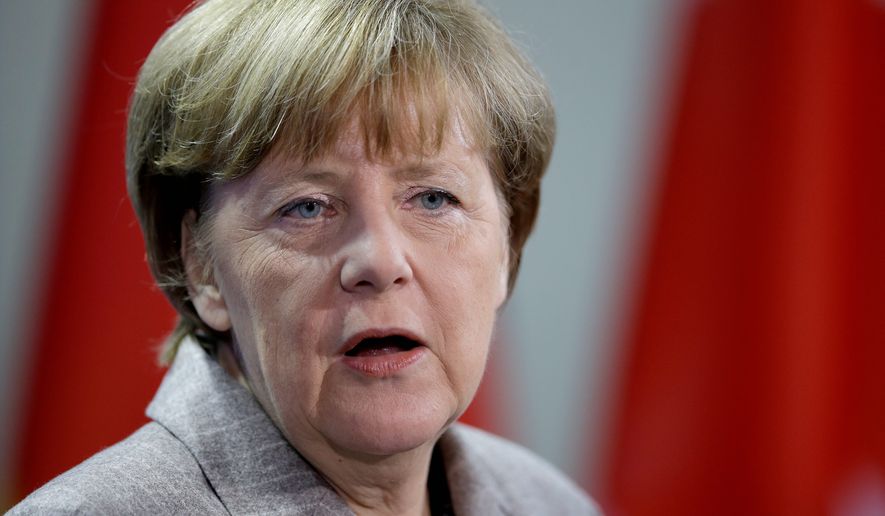BERLIN — If Greece’s newly leftist government thinks Germans will soften their hearts and renegotiate the harsh terms of bailouts that have been propping up the Greek economy in recent years, they are out of luck.
Europe’s economic powerhouse and champion of austerity showed little signs of a shift in sentiment given the stunning election results from Athens on Sunday.
“They can’t just erase their debts and tear the EU apart,” said Undine Gogol, a 70-year-old German from Berlin.
Ms. Gogol’s comments reflected the widespread reaction in Germany to the election that propelled the far-left Syriza party to power in Greece on Sunday, riding a wave of resentment to the very policies German leaders have been insisting upon as a condition of more aid.
“It seems like the Germans are very tightly keeping to this idea of ’We’re not going to move, we’re not going to make any concessions, and we have to stick to this prescription of austerity measures and policy reform,’” ING senior economist Carsten Brzeski said in Frankfurt.
Syriza leader and now Prime Minister Alexis Tsipras has vowed to secure new terms for repaying the $240 billion in bailouts arranged by the “troika” — the European Union, the International Monetary Fund and the European Central Bank — after the eurozone crisis erupted in 2009.
German Chancellor Angela Merkel has demanded that Greece hike taxes, cut spending and implement other reforms in return for the rescue.
The austerity measures highlight a deep divide in economically beleaguered Europe between the stereotypically frugal and productive north and popular images of the spendthrift, inefficient countries on the Continent’s Mediterranean rim.
Citing Greece’s underperforming economy, Mr. Tsipras says austerity is unfair and counterproductive, a charge that many U.S. economists second. He gave another clear signal of his plans Tuesday by naming as his coalition government’s finance minister economist Yanis Varoufakis, an outspoken austerity critic who once described the bailout terms as “fiscal waterboarding.”
But most Germans are adamant that Greece stick to the terms of the deal.
“A treaty is a treaty,” said a headline in Bild, Germany’s most popular tabloid newspaper.
Rejecting blackmail
It’s not just a populist reaction: Top-level German policymakers expressed the same sentiment.
“The eurozone must send signals for the coming negotiations that it is not susceptible to blackmail should Greece threaten with a payment stop,” said a statement by the Center for European Economic Research in Mannheim, in western Germany.
The European Central Bank’s decision to purchase $1 trillion of government bonds from March until September 2016 — modeled on the U.S. Federal Reserve’s quantitative easing program to stimulate the economy — is likely strengthening German opposition to renegotiating the bailout, said Mr. Brzeski. Germany opposed the bond-buying program, viewing it as tantamount to printing money that could create asset bubbles and fuel inflation down the line.
“It made them a bit scared that things are moving out of their hands,” said Mr. Brzeski, referring to Mrs. Merkel and other German politicians.
But Germany’s resolve is now on a collision course with Mr. Tsipras’ election mandate. A “Grexit,” or Greece abandoning the euro, is a real possibility, Mr. Brzeski said, which would seriously undermine confidence in the euro’s long-term viability.
“It is now very hard to come up with a scenario where the two parties, the Greeks on one side, the Germans and the Europeans on the other, can find a compromise,” he said.
European leaders will need to address the eurozone’s shortcomings in the months ahead. The Greek vote signaled the first time Europeans have repudiated austerity measures. Similar anti-austerity parties also have popped up in Spain.
Still, some believe some of the Greeks’ criticisms have merit, after five years of near-depression-level economic reverses.
While the bailouts and austerity measures saved the Greek economy from collapse — technically, Greece emerged from recession late last year — they failed to instill the business confidence and investment that advocates said would result from a balanced budget and economic reform.
Instead, as the Greek government collected more revenue from the private sector and slashed public services that provided a safety net to millions of people, unemployment skyrocketed to more than 25 percent and the jobless rate among young people was nearly 60 percent.
To Greeks who supported Syriza, the perils of ending austerity seemed preferable to the suffering associated with continuing it.
Still, many Germans are understandably leery about altering bailout terms, which are intended to get Greece on track.
“It would be disastrous to now stop halfway,” said a statement by Markus Kerber, German industry managing director. “The reforms are painful but correct. With good economic policies, Greece has the chance to significantly improve its situation.”




Please read our comment policy before commenting.